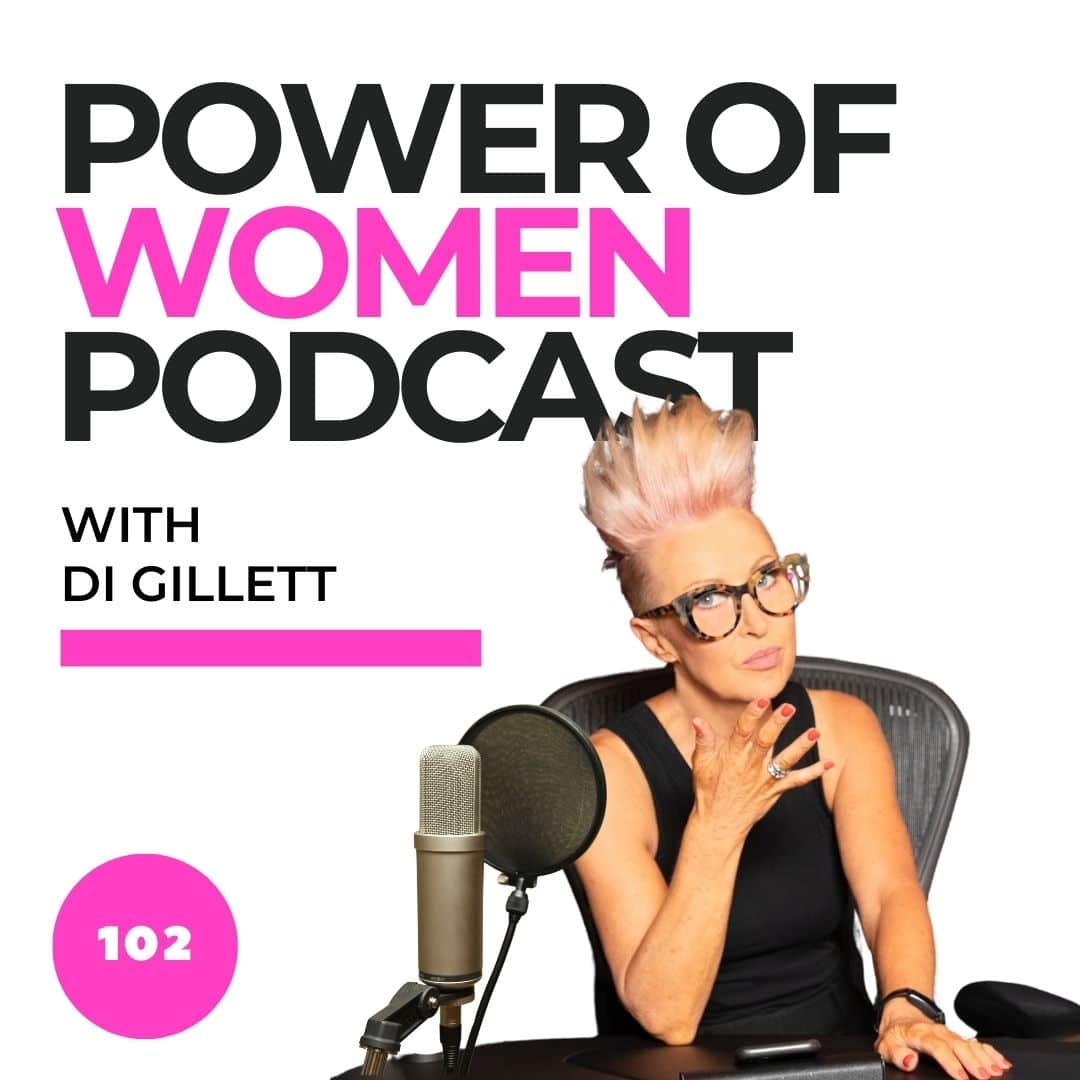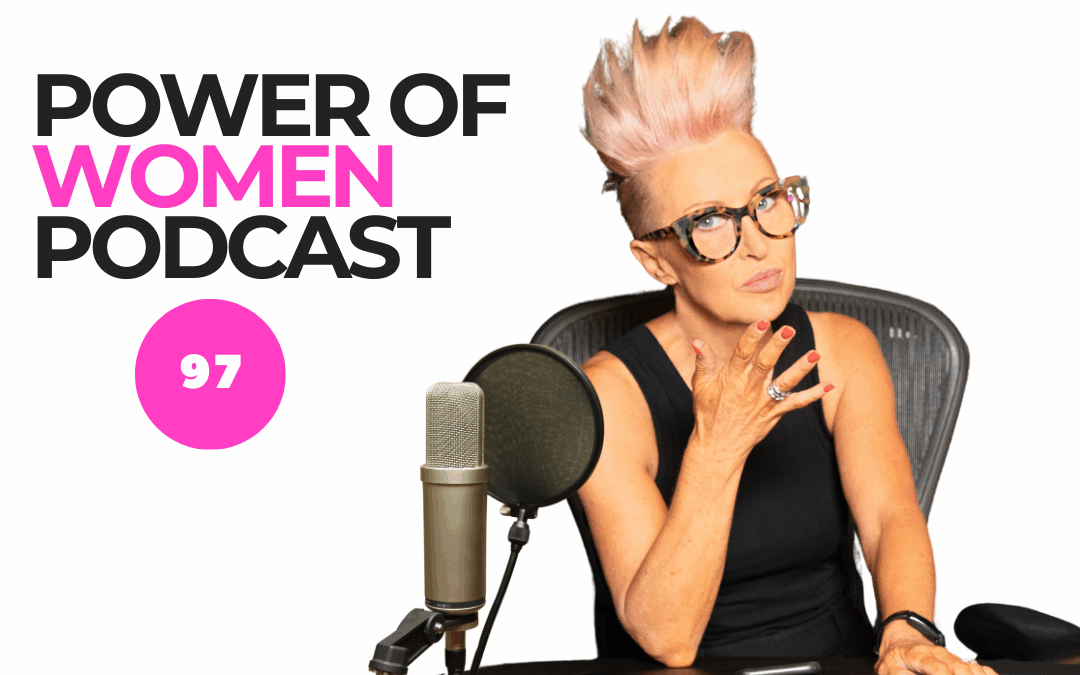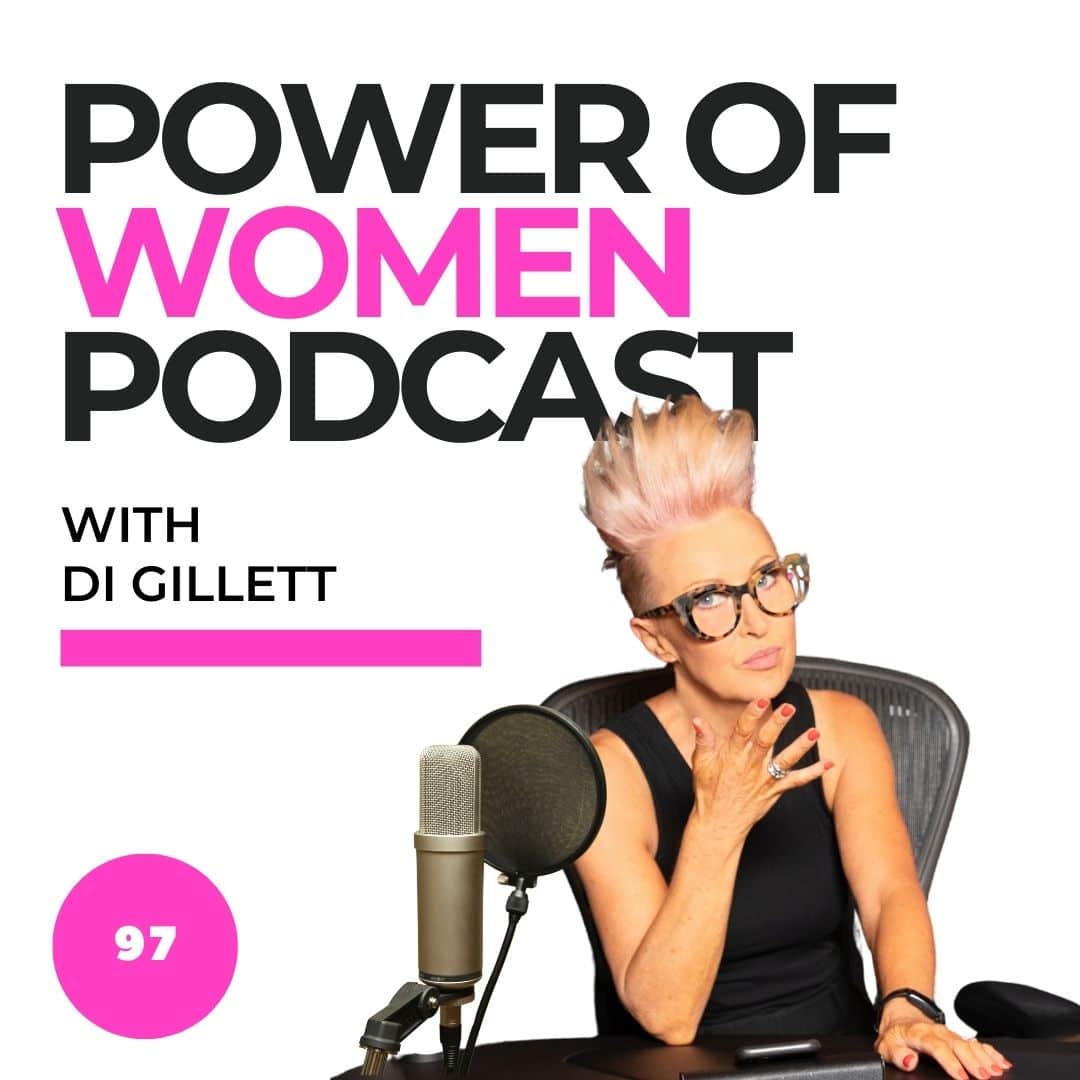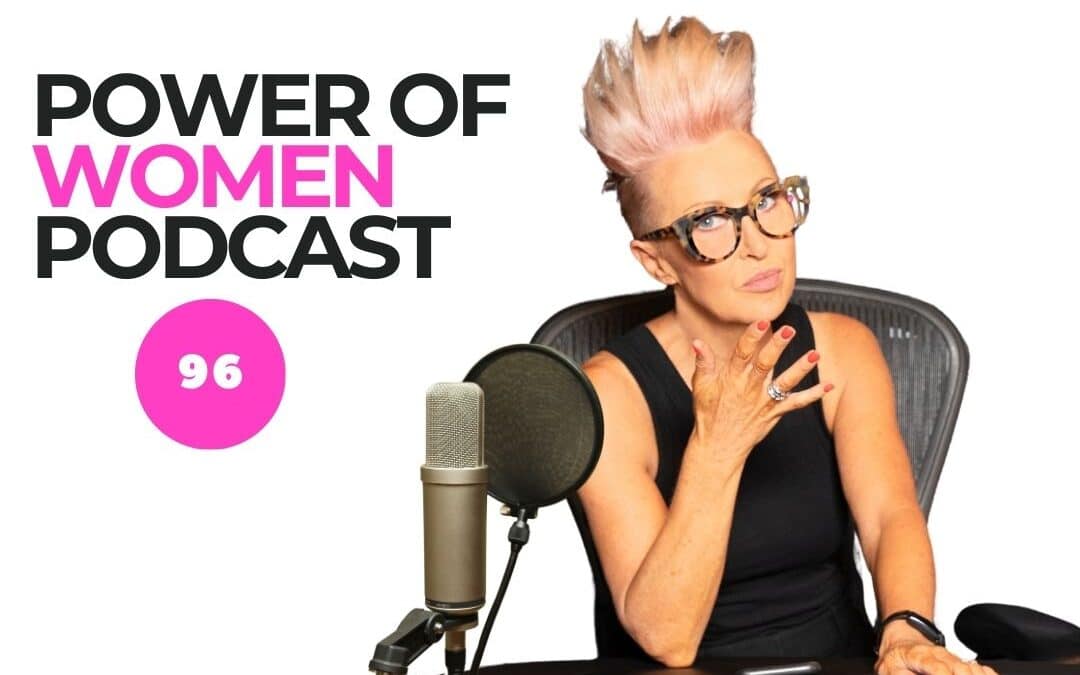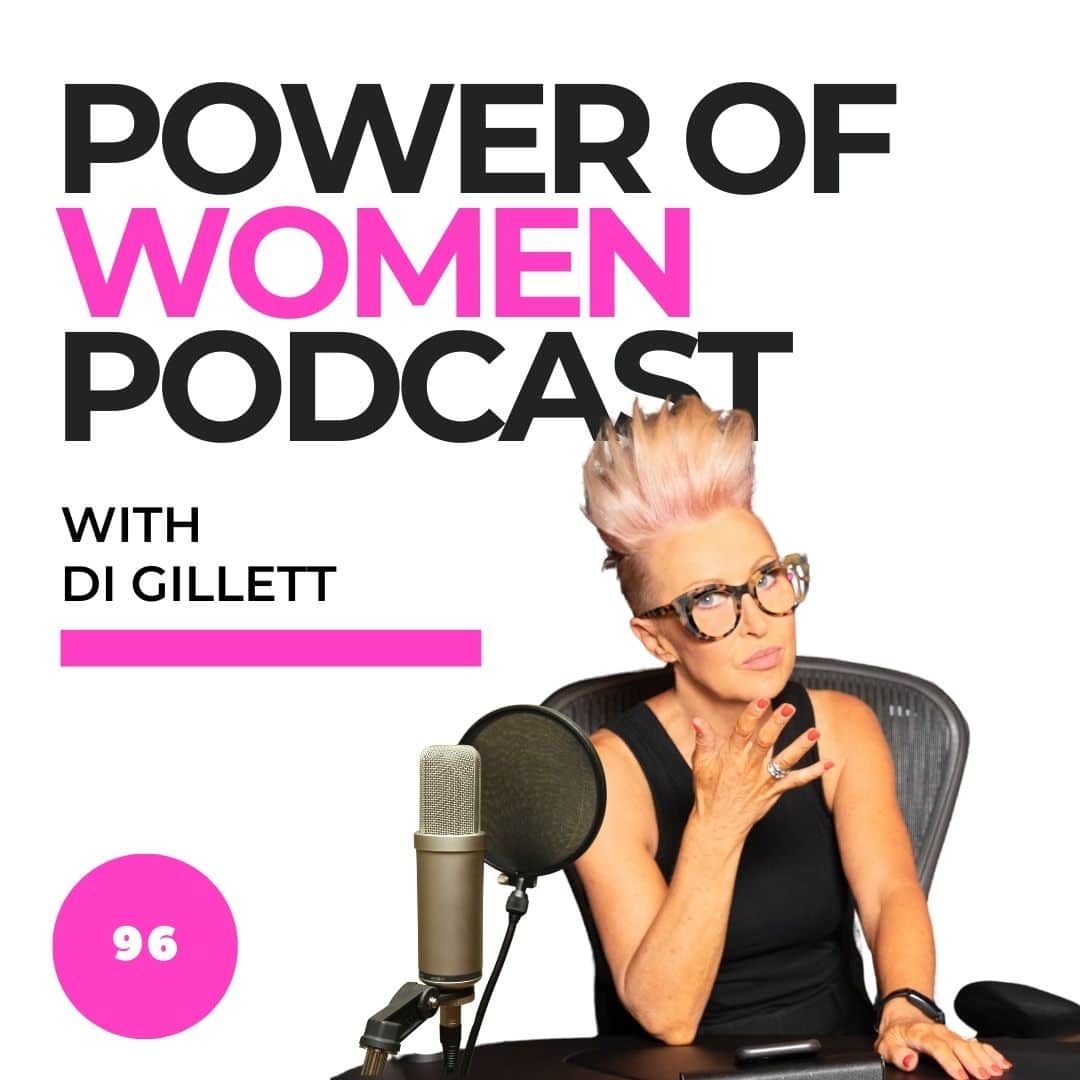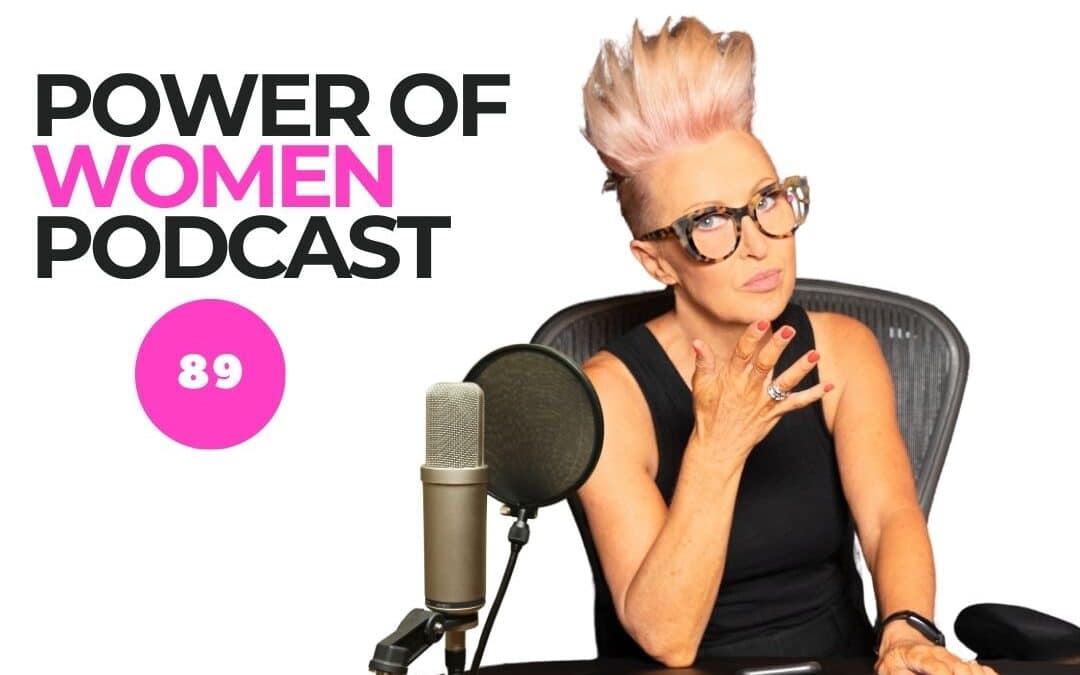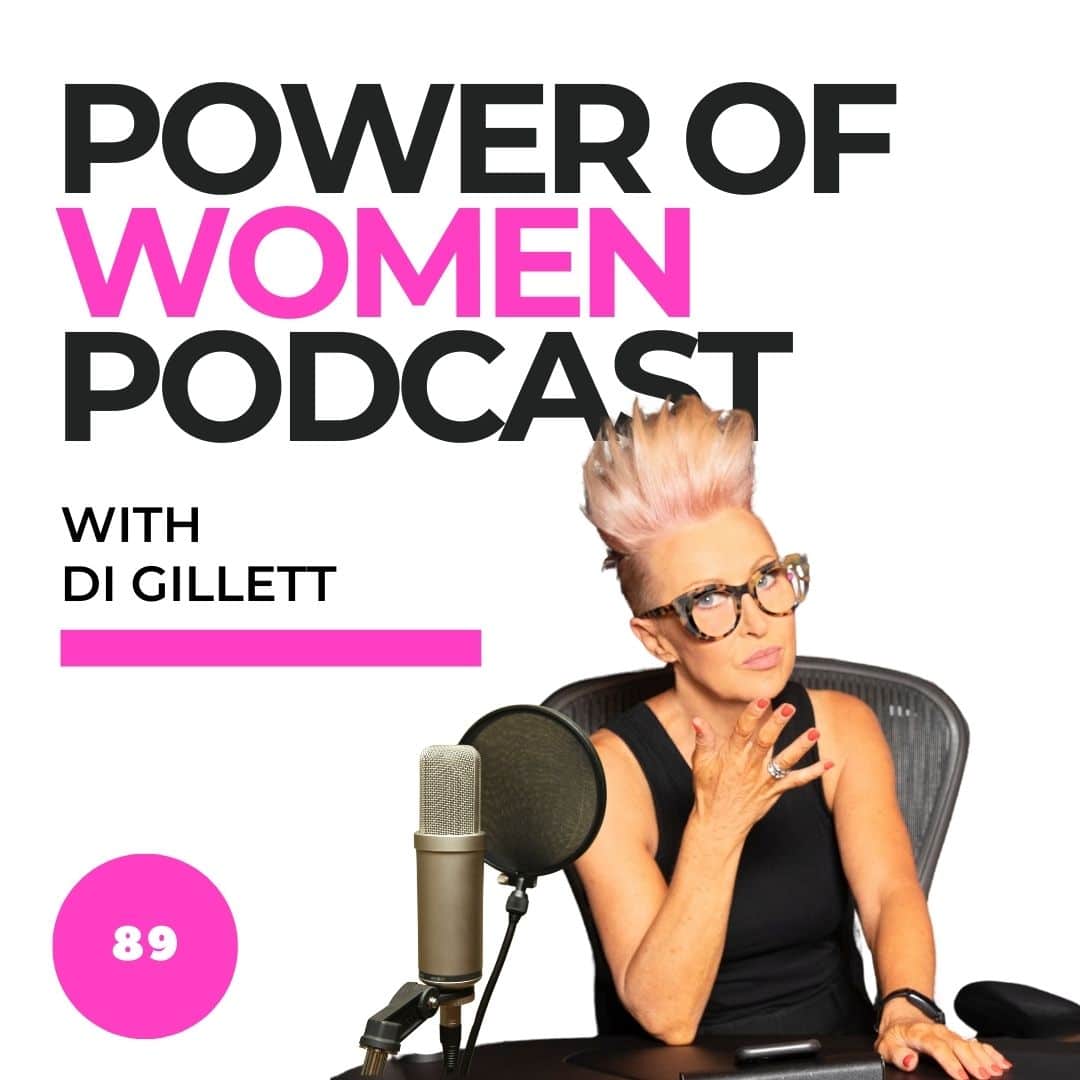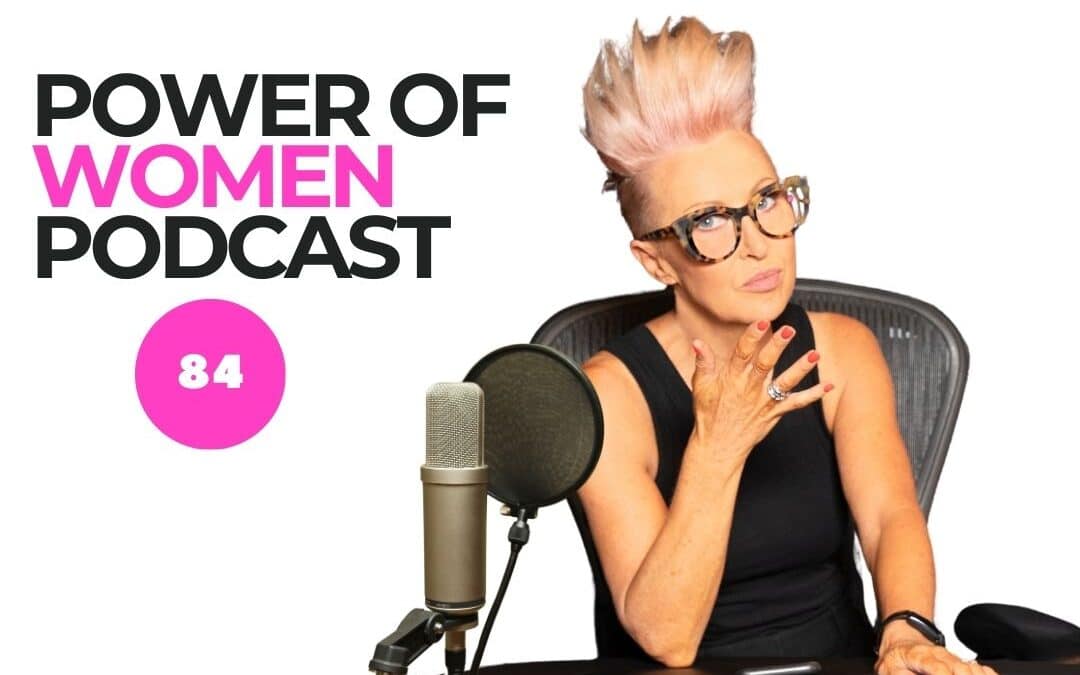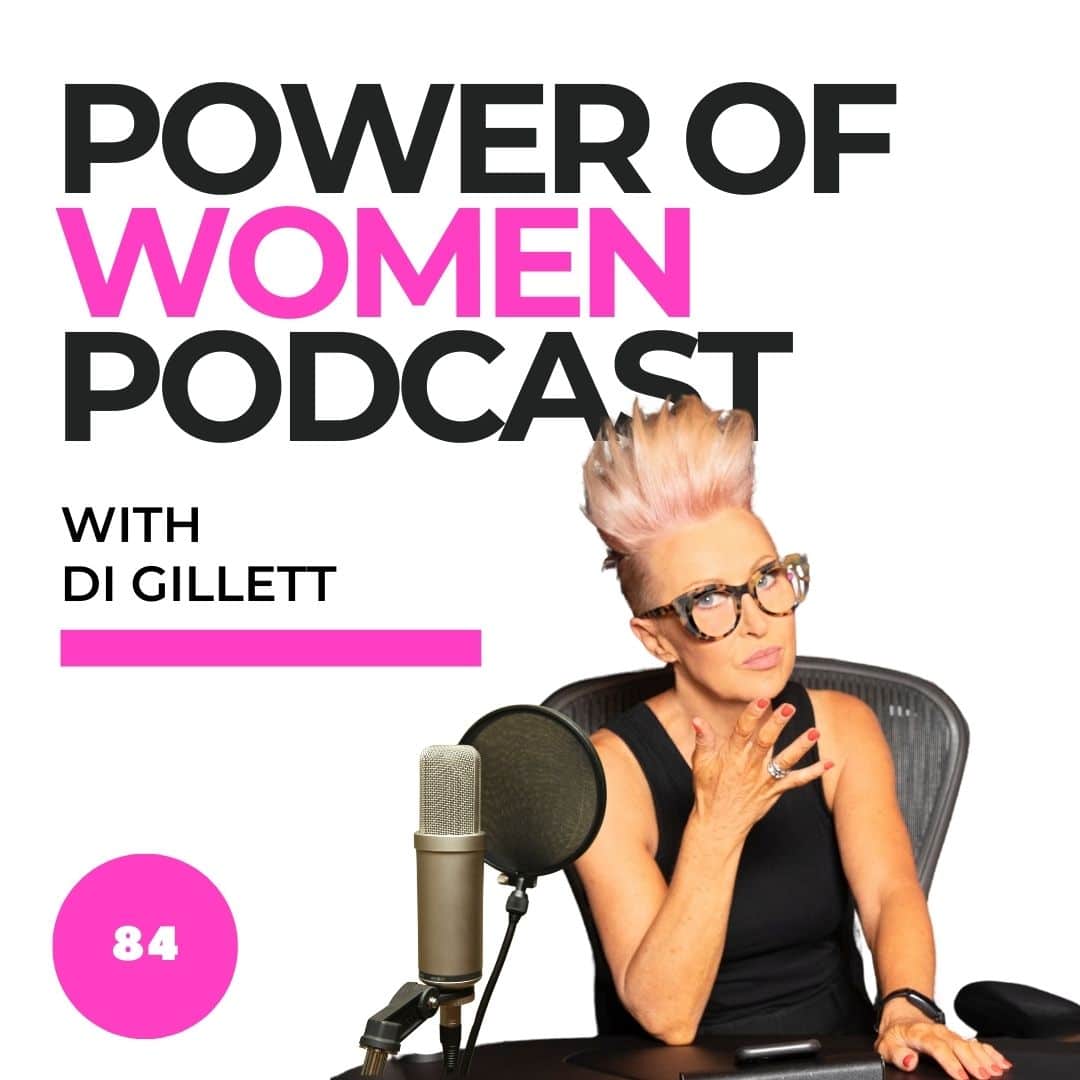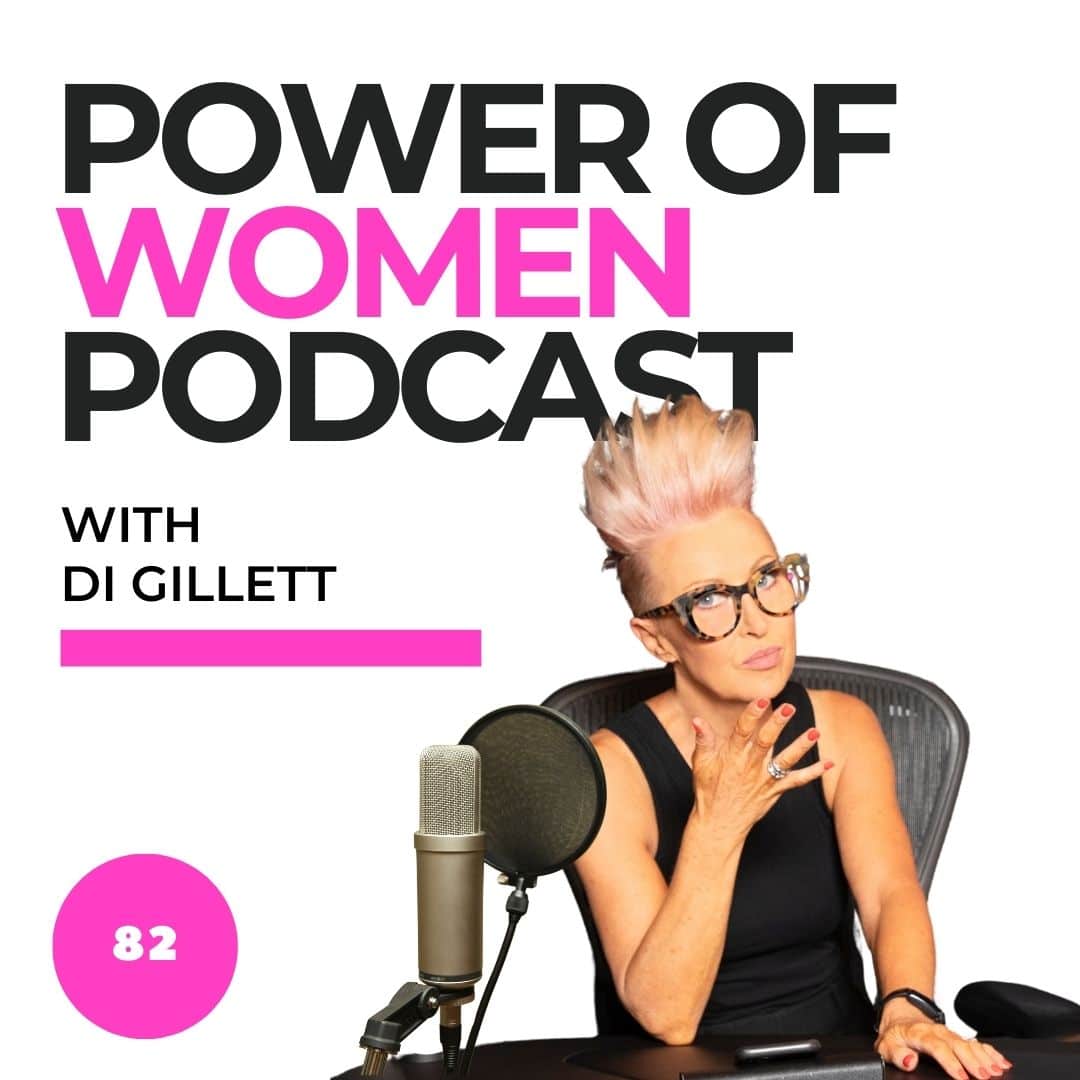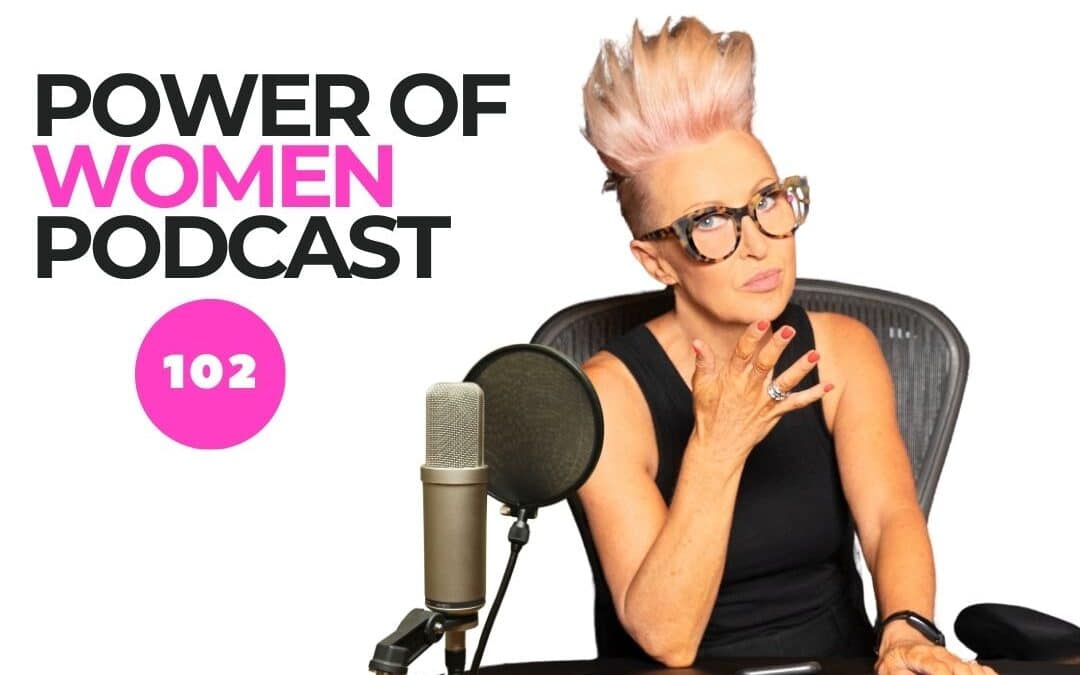
Let’s Talk About Women’s Longevity: Why We Should Rethink Ageing & Healthspan
In this powerful and deeply relevant conversation, Di Gillett is joined by Maddy Dychtwald, globally recognised futurist, author, and co-founder of Age Wave – to talk about longevity and challenge outdated narratives around ageing, retirement, women’s health and relevance.
Women are living longer than ever before – yet spending more years in declining health. Maddy unpacks why lifespan is the least useful measure of ageing, why healthspan and brainspan matter far more, and how up to 90% of our long-term health outcomes are within our control.
This conversation goes well beyond theory. From inflammation, menopause, and Alzheimer’s risk, to workforce ageism, outdated retirement models, and the power of lifestyle choice, this episode is a call to reclaim agency – personally, professionally, and biologically.
This is not about anti-ageing.
It’s about ageing with authority, vitality, and intention.
We explore:
- Why women are winning the longevity lottery, but paying a hidden price
- The critical difference between lifespan, healthspan and brainspan
- How inflammation accelerates ageing – and what actually reduces it
- Why women are twice as likely to develop Alzheimer’s
- The outdated retirement model that no longer serves women or economies
- Ageism as the last socially acceptable bias
- Why older women are an untapped workforce advantage
- How purpose, attitude, and social connection directly impact longevity
- The lifestyle levers that matter most – beyond diet and exercise.
Key takeaways:
- Up to 90% of health and wellbeing is influenced by lifestyle, environment, and access to science
- Ageing well is not about genetics – it’s about epigenetics and choice
- Health systems treat illness; longevity requires prevention
- Muscle mass, inflammation reduction and social connection are non-negotiables
- Retirement as we know it was designed for a world that no longer exists
- Older women bring resilience, wisdom, and leadership – not obsolescence
- Attitude toward ageing can extend life expectancy by up to 7.5 years.
Maddy said:
“We truly are becoming the CEOs of our own health and wellbeing.”
“Up to 90% of our health and wellbeing has to do with our lifestyle choices, our environment and the science that we have access to.”
“People associate the 70s and the 80s as being a time for falling apart. And I refuse to be that.”
📖 Read the full transcript of this conversation here 👇
FULL TRANSCRIPT:
MADDY DYCHTWALD: Guest (00:02)
On the very first day of the 20th century, average life expectancy was only 47. So inflammation is a huge deal. ⁓ It’s one of the what’s called hallmarks of aging. So in other words, it’s one of the factors that really create negative health spans. They tell us that up to 90%, 90 %?
of our health and wellbeing has to do with our lifestyle choices, our environment, and the science that we have access to. We have fewer young people entering the workforce ⁓ than we ever did before. So in many corporate environments, in many entrepreneurial environments, we need the older workers ⁓ just because we need those bodies. You know, get rid of the gluten, get rid of the dairy.
get rid of as much sugar as you can. So, you know, I did that. And by the way, that was the secret sauce.
Okay, so ⁓ I’ve been digging deep into aging, longevity, the new retirement for close to 40 years. 40 years, and that’s probably longer than some of your listeners have even been alive. And what I’ve really come to understand is that a couple things. First, we women, we are very different than men. And the way we age and we
behave in the second half of life very different than men. ⁓ The other thing that I came to really understand is that longevity, it’s been kind of like a bro thing up until now. Part of the reason I got so obsessed with really understanding aging and longevity is because when I looked at what books and information was out there,
It was mostly dominated by men. And I’m like, whoa, this is really wrong. We need to change this drama. We need to bring women into the fold and have us better understand how we can live better longer. And that’s really what I’m all about.
DI GILLETT: Host (02:27)
What if everything you’ve been told about aging is wrong? And what if the only thing standing in your way is the outdated narrative we’ve inherited? I’m Di Gillett and welcome to the Power of Women podcast. And what I love about this platform is the opportunity to showcase and celebrate the strength, resilience and achievements of women from all walks of life.
And today’s conversation is absolutely one of those that we all need to hear because we’re living through a longevity revolution, especially for women. And as today’s guest points out, we’re living longer than ever before. Women are outliving men by five years and 50 year old women today can expect another 35 years in life. But there is an uncomfortable truth because we’re living longer.
but we’re not living well. And the average woman spends the last 14 years of life in declining health despite science saying that 70 to 90 % of our longevity is within our control. My guest today is a global visionary who is rewriting the narrative of what it means to age as a woman. Maddy Dychtwald is a celebrated author, researcher,
and co-founder of Age Wave, the world’s leading consultancy on aging, retirement, and the future of longevity. And for more than 40 years, she’s studied how longer lives are reshaping identity, health, work, money, and purpose. And her book, Ageless Aging, is a blueprint for women not just to live longer, but to live better, stronger, sharper, and more empowered.
Maddy Dychtwald welcome to the Power of Women podcast.
MADDY DYCHTWALD: Guest (04:22)
Thanks Di it’s a pleasure to be here.
DI GILLETT: Host (04:25)
Fab. Maddy, I feel so privileged and I know you’ve mentioned that you’re going through a cleanse at the moment, which I think is terribly fitting with the lifestyle that you lead and are promoting. And you’re a subject matter expert on the topics of aging, longevity, brain span, lifespan, and you’ve been recognised by Forbes as one of the top 50 futurists globally.
What actually drew you to this work in the first place?
MADDY DYCHTWALD: Guest (05:00)
Believe it or not, it was just kind of by accident, which so many things in our lives happened by accident. I was working in Los Angeles as an actress, and I was an actress at the time, not an actor. I was lucky enough to be… I know, right? Very big distinction. And at the time, I was lucky enough to be employed all the time, doing a lot of television commercials, working on a soap opera.
And when I started to realize is I would go to auditions and they would talk to women who were like 30 plus as if they were over the hill. And I’m like, what, what, what’s going on here? What kind of reality is that, that women, once they hit a certain age, whether it be 30, 50, or even 70, that they no longer count, that they’re no longer relevant to their social.
lifestyle, workplace. ⁓ It just seemed so insane to me that I became really interested in it. And then coincidentally, I met my husband who had written a book about the demographic shifts, which he called age wave. So about the fact that we used to be a world where all the action was with younger people because that’s where the growth in the marketplace was.
but that it has really, we’ve seen a flip-flop. We’ve seen suddenly that while people in the younger age groups, ⁓ they used to be fast growing, ⁓ that’s where we’re seeing shrinking populations. And in the 50 plus population, we see them as the fastest growing populations. So the whole idea of what is old and what is young,
is beginning to shift as a result.
DI GILLETT: Host (07:00)
How long ago was that that they were talking to 30 year olds with or purporting 30 year olds were were aging Maddy just to put a line a line
MADDY DYCHTWALD: Guest (07:11)
Sure,
that’s a good question. So I’m 75.
DI GILLETT: Host (07:16)
And look at you!
MADDY DYCHTWALD: Guest (07:18)
Well, thank you, I think. You know what, this is such a really difficult thing to talk about because you can look great at any age, at 60, at 90, at 42, and you can look horrible also at those ages, depending on the way you live your life and the science that you are able to have access to. So, you know, most of it is up to you, but not all of it.
So yeah, at the time, 50 was considered over the hill. In fact, Ken and I, my husband, when we started Age Wave, we would go into corporations that we were working with as keynote speakers to talk about the future of aging and longevity. And at that time, 50 was considered over the hill for women and men.
DI GILLETT: Host (08:11)
Yeah. And that’s been a big part of what I’m reporting on the podcast. I’m early 60s and you’ve now become my pinup for 70s. I think I’ve become look pretty amazing. But similarly to you, it’s been lifestyle choices behind that. that
MADDY DYCHTWALD: Guest (08:26)
yourself.
DI GILLETT: Host (08:35)
That is part of what I would love to explore in detail with you today, Maddy. Because you describe this as a point in time that it’s a longevity revolution. For the female listening, what exactly do you mean by that?
MADDY DYCHTWALD: Guest (08:54)
Okay, so throughout most of history, people really didn’t have the opportunity to age. They died. ⁓ In fact, you would see that it wasn’t until the 20th century that we saw average life expectancy begin to skyrocket. as an example, on the first day, well, actually, let’s try that again. On the very first day,
Of the 20th century, average life expectancy was only 47. 47. And by the last day of the 20th century, it had gone all the way up on average for women and men, the average went all the way up to 78. So think about, yeah, it’s like year longevity. What I think of as a longevity bonus.
DI GILLETT: Host (09:43)
Goosebumps, yeah. Literally got goosebumps.
MADDY DYCHTWALD: Guest (09:51)
30 extra years of life.
DI GILLETT: Host (09:54)
So how much of that do we contribute to medicine versus how we actually choose to live?
MADDY DYCHTWALD: Guest (10:01)
That is a great question. So a lot of the breakthroughs that happened in the 20th century had to do with science and medicine breakthroughs, had to do with antibiotics were suddenly very popular and accepted. ⁓ Sanitation, simple things like sanitation and refrigeration really helped us to live better longer. But today, the kinds of breakthroughs we see and the kind of breakthroughs we need
are very, very different than what they were then. Now, today, more lifestyle and environmental kinds of breakthroughs are needed. And I would say that the science is still evolving, so it puts a lot of pressure on the lifestyle choices we make. We truly are becoming the CEOs of our own health and wellbeing.
DI GILLETT: Host (10:55)
I love that framing. So the stats are really concerning, Maddy, because we’re living, as you’ve just pointed out, we’re definitely living longer than ever. Yet we’re spending more years in poor health. Where’s the disconnect happening?
MADDY DYCHTWALD: Guest (11:14)
Okay, so this is a very simple thing to understand. So just to put it into context, we used to think that genetics were our destiny, that it had nothing to do with the choices we made in our lives, that most of our 75 % of our health and wellbeing had to do with our genes. yeah, so that, okay, no problem. We don’t have to care about what we eat or if we exercise or.
what our sleep looks like and yada, yada, yada. But the most recent breakthroughs in science tell us a very different story. They tell us that up to 90%, 90 % of our health and wellbeing has to do with our lifestyle choices, our environment and the science that we have access to. Now that’s literally a breakthrough kind of
concept that we are in charge of our own health and well-being and that the choices we make make a difference in not only how long we live but in how well we live and that is huge. That has to do with our health span and our brain span as well as the number of years or our lifespan.
DI GILLETT: Host (12:33)
Why are so many people ignorant to this? know you’re out there, you’re going and doing presentations. What is the reason? And I’m going to focus on women being the power of women, Maddy, but why is there such a large cohort that just don’t know this?
MADDY DYCHTWALD: Guest (12:53)
That is the million dollar question. Actually, it’s the trillion dollar question because that’s how much it’s costing us in terms of our health and well-being on a personal level, on a societal level. It’s a huge number.
DI GILLETT: Host (13:07)
So that was my question, what is the cost of not knowing and it’s trillion.
MADDY DYCHTWALD: Guest (13:11)
The cost is enormous and part of the problem, part of the challenge, I should say challenge, is that we’ve created a health system in our country that is really a sick care system rather than a healthcare system. So we’re not so great about preventing disease. We are fantastic at treating disease once it happens.
DI GILLETT: Host (13:39)
we’re the same. Yeah. It’s that band-aid approach to everything of let’s let’s approach the the cure-all after the event rather than preventing the event. That is such a ridiculous mindset for intelligent people to come to.
MADDY DYCHTWALD: Guest (13:55)
Yeah, but you know what? A lot of people just don’t know, don’t understand. Also, some people just don’t care and they don’t necessarily like trust the science.
DI GILLETT: Host (14:06)
Can I be not to be a conspiracy theorist, but is it commercially advantageous to keep the system running as healthcare?
MADDY DYCHTWALD: Guest (14:16)
I think there’s a lot of frustration with the healthcare system by not just patients, but people who work in the healthcare system. Now, I want to be really clear that most of the people who work in healthcare are very well-meaning and they want to do a good job, but they’ve been taught to do things in a way that no longer is effective.
And I think that that’s the rub. mean, the average doctor spends 15 minutes at most with a patient. I mean, how can you get anything accomplished in those 15 minutes? ⁓ It’s just not conceivable. yeah, it’s integrated into the system. So, which means even more so that each and every one of us needs to understand that there is a solution.
And the solution is, by the way, this kind of holistic recipe. It’s not just about one thing, but it’s about things like sleep and exercise and nutrition and social connections. ⁓ Your work life really matters. mean, all these things work together. They don’t exist in silos. Now, I know this is really hard to kind of keep in your mind without a visual, but
When I set out to write Ageless Aging, I reached out to my network of experts, which are top experts, researchers, scientists, physicians. And I was surprised that, first I was surprised that almost everyone got back to me. So there was like 90 people that got back to me. But besides that, I was surprised to see there was a lot of agreement about what works, what doesn’t work. So, yeah.
I think that ultimately it is. We know what works and it’s not about your genes, it’s about turning the good genes on and turning the bad genes off. That’s called epigenetics.
DI GILLETT: Host (16:10)
Good starting point.
Yeah. Now you mentioned ⁓ social connection. Yes. And there must be an interface between social connection and the fact that we are still wedded to a 1980s, an 1880s version of retirement. Because retirement is one of these things that does absolutely lead to social
disconnection because it’s the point where so many people come together. Why are we so outdated in how we’re hanging on to this whole view of what is the retirement age and when we call time on our careers?
MADDY DYCHTWALD: Guest (17:08)
That’s a very complicated question. Let me try to pull some of the threads on that. You’re right. 1880s Otto von Bismarck was the one who created the first pension program for Europe. And at the time, average life expectancy was only 47. And he chose the number 65 as retirement age. So think about that for a minute. He was a very
DI GILLETT: Host (17:34)
Until
you died.
MADDY DYCHTWALD: Guest (17:36)
Yeah, exactly. It was not meant to be for anyone, for very few people. ⁓ Let’s fast forward to today where average life expectancy has skyrocketed all the way up to in the US, 78. It’s even higher in Australia, in Great Britain, and a lot of other countries. And what we see is that because we’ve been wedded to a system that was put into place
such a long time ago, it is creating incredible stress on our government and our governments. mean, it’s global issue, not just in the United States and then on us individually, because as you pointed out so beautifully, Dee, ⁓ the workplace happens to be a great place for socialization. Just to put it into a context.
My company Age Wave, we do a lot of research. And one of the questions we’ve asked in a very recent study that we put out there was we asked retirees and we asked pre-retirees, what are you going to miss most about the workplace? So we asked pre-retirees, people who are still working, and they said, we’re going to miss the money. And when you think about it, that makes a lot of sense. I mean,
Living on a fixed income seems overwhelming and seems like, know, wow, if I could delay that for a little while, that would be a smart move. So that makes sense. However, when we asked retirees, they had a very different answer. They said it was the social connections. The money still mattered, but the social connections soared.
DI GILLETT: Host (19:27)
And those in the workplace just hadn’t imagined it because they hadn’t experienced it and they didn’t. That was yeah.
MADDY DYCHTWALD: Guest (19:32)
Exactly.
Because of COVID, we saw a lot of people stay home to work and we’re beginning to see that change. People are going back into the workplace. Why? Because they’re finding that they missed the social connection, the brainstorming, the ideas that you can come up with as a group rather than being single-minded.
DI GILLETT: Host (19:57)
Yeah, I can understand that. We’re having the same experience here in Australia, Maddy. what happens to a woman cognitively, psychologically, physically, when she gives up work and it’s before time, it might have been imposed upon her or they pulled the pin or they’ve simply lost their job?
MADDY DYCHTWALD: Guest (20:20)
Interestingly, while we know that women have won the longevity lottery, mean, we live longer than men, as you pointed out, in every country, ⁓ actually in every species. So it’s not just in humans.
DI GILLETT: Host (20:35)
That’s so yeah. Yeah. There you go
MADDY DYCHTWALD: Guest (20:38)
Yeah, but we spend more years in retirement than men. And the impact that that has is pretty dramatic. ⁓ First, we’re taking off time along the way to care give our children.
DI GILLETT: Host (20:53)
So we’ve got broken income in retirement savings.
MADDY DYCHTWALD: Guest (20:57)
That’s That’s exactly right. Yeah. You know the answer. Yeah. We’re not getting the pensions that we should. We’re not getting the social security that we should. Then we retire early, oftentimes because we could be married if we are married or partnered to someone who’s a little bit older than us who might be getting sick and need us to care for them. ⁓ Add to that.
DI GILLETT: Host (21:23)
This
lottery is looking pretty shabby at the moment.
MADDY DYCHTWALD: Guest (21:26)
Oh, I can make it even worse. I won’t try to make it worse because women are incredibly having the information that you can be in charge of your own health and well-being and that you can find mechanisms to stay socially active and full of a sense of purpose and take the right steps to live better longer. Not only does that feel empowering, it can increase our vitality.
our mental energy and our sense of purpose and wellbeing. So yeah, I would tell every single woman out there and I talk about it in Ageless Aging, ⁓ there’s some hacks, there’s some steps that each and every one of us ought to take to live better longer, especially women.
DI GILLETT: Host (22:18)
And you’re a pin up for that, Maddy, because you’re, I mean, but you are, you’re professionally engaged, you’re out there in the community, you’re following, and we’ll get to that in some more detail if we could, some lifestyle protocols that are improving your longevity and wellbeing, the importance being the two things together.
Could I ask if you had the opportunity, and I’m sure you do to an extent in the work that you’re doing, but if you could sit down in front of CEOs and hiring managers in organizations across the marketplace, what would you be telling them about retirement and the older workforce?
MADDY DYCHTWALD: Guest (23:11)
Mm.
See, that’s a simple but complicated question. For one thing, we have fewer young people entering the workforce ⁓ than we ever did before. So in many corporate environments, in many entrepreneurial environments, we need the older workers ⁓ just because we need those bodies. Second, exactly. Older workers.
There’s some stereotypes that they’re not tech savvy. That is not true at all. ⁓ There’s some stereotypes that don’t really take into account the fact that they have wisdom and accumulated experience that can be of value to not just themselves and their company, but to their coworkers, especially to younger workers. And what we’ve seen is there’s this great opportunity
for older workers to mentor young ones and younger ones to mentor older ones because they can share skills. And it’s very empowering for everyone. So I think that there’s these misconceptions and concepts that older workers do not have wisdom, which is totally false, that they are not resilient. And in fact, studies have shown that
The older we get, the more resilience we get. So we’re able to handle stress far better than younger people. And we know that, you we’ve been through a lot. We’ve been through COVID, we’ve been through up turns and down turns in the marketplace. We’ve been sick, we’ve cared for older adults, younger children. We’ve seen it all. So we know that we can not only get through it, but that we can…
actually prevail and do well. And I think that having that kind of a mindset is an incredibly valuable tool for any worker and that corporate leaders who don’t take advantage of it are going to be losing out come the next decade.
DI GILLETT: Host (25:27)
And I think on that aging piece, Maddy, too, with wisdom, we’ve only got to look at indigenous cultures around the world who actually value elders as distinct to how we seem to do in first world cultures. We’ve got a lot to learn.
MADDY DYCHTWALD: Guest (25:44)
That’s right. That’s right. And we have not learned the lesson well. mean, this one ism that is still very acceptable is ageism, especially aimed at women, especially something that I call lookism, the idea that, well, if you don’t look a certain way, we don’t want you around.
DI GILLETT: Host (26:05)
Well, we all know gray for men is applauded, gray for women is criticized. Proud to palm. Yeah, yeah, so we know that. Well, coming up, how inflammation actually accelerates aging and why women are twice as likely to develop Alzheimer’s.
If you’re loving the Power of Women podcasts, be sure to jump onto our YouTube channel and hit that subscribe button to ensure you never miss an episode. I’m talking with Maddy Dychtwald, globally renowned futurist and subject matter expert about extending our health span, our brain span and our lifespan. Maddy, you write that lifespan is the least meaningful.
measure of aging and that health span and brain span are actually what matters. Why are we still focusing then on the wrong matrix?
MADDY DYCHTWALD: Guest (27:05)
I think the idea, okay, let me try this another way. Here we are in the 21st century and there are a lot of what I call tech bros who are at the leading edge of longevity and they’re great. I mean, they’re really, they wanna see how long they can live and they haven’t necessarily connected it with the idea of how well they can live.
So they’re investing a lot of dollars and a lot of time and a lot of energy into extending lifespan or life expectancy, which we’ve done a pretty good job of. Let’s be honest about it. However, there is a total disconnect between lifespan and health span and as well brain span. And let me tell you what I mean by that. How span it’s really simple. The number of healthy years that you live. So in
The US also in Australia, by the way The average person spends the last 12 years of their lives in a cascade of poor health things simple as aches and pains ⁓ heart disease ⁓ All kinds of chronic degenerative diseases of strokes people are frightened of strokes worst of all
Alzheimer’s disease and I’ve seen it firsthand. My mom, yes. I mean, when you see someone suffering from Alzheimer’s disease, it not only breaks your heart, it scares you to death.
DI GILLETT: Host (28:33)
have on.
That’s
right. Yeah, that’s right. How much has, and that’s an interesting point, Maddy, how much has watching your parents in the generation before you sparked you and motivated the actions that you’re taking?
MADDY DYCHTWALD: Guest (29:01)
No, it’s a great deal. I would just say that, you know, watching my mom, my husband, Ken, his mom also suffered from Alzheimer’s disease and it manifested very differently in each of our parents. But watching both of them was, it was heartbreaking. And we became, Ken and I both became advocates for, let’s not see how many great caregivers we can get, which is important, but there are a lot of people
doing that work. Instead, we wanted to help fund the research to find a cure for Alzheimer’s disease. And you know what? We still haven’t found a cure.
DI GILLETT: Host (29:44)
So let’s get into a conversation we could then about inflammation because I think that’s, there’s a direct correlation here. What are we doing in living our lives that is the trigger to this inflammation in our body that’s leading to our aches and pains, that’s leading to the cognitive decline? Is there one or two significant areas you could highlight?
for us.
MADDY DYCHTWALD: Guest (30:16)
Okay, me, so inflammation is a huge deal. ⁓ It’s one of the, what’s called hallmarks of aging. So in other words, it’s one of the factors that really create negative health spans and brain spans in your life, no matter who you are. And what’s so beautiful about inflammation is a lot of it is within our control. So I’ll use myself as an example. ⁓
seven years ago, was experiencing excruciating hip pain. And I’m a huge exerciser, which by the way is probably the best thing that I do for myself. But I was like limping around to the point where my son turned around and said to me, mom, what’s with you? You look like you’re 90 years old, get yourself to the doctor. So I did and I tried everything. I tried ⁓ just, know, cortisone treatments and.
I tried going to physical therapy. I tried stem cells. I tried PRP. I did it all. And all of it worked for a very short time. And finally got an MRI and I learned that I was bone on bone in both my hips. I had been born with hip dysplasia and I didn’t know that, you know. Today they do something about it with an infant, but for me, like nobody knew.
even what hip dysplasia was 75 years ago. So, you know, I became hysterical. My doctor said to me, you need to get hip replacements. So I did my research, found a doctor to do a double hip replacement, both hips at once, but he couldn’t take me for three months. And so I said to him, what should I do in the meantime? And he says, well, get a cane. And I’m like,
Okay, that’s a great idea as a last resort, but it’s not the way I that’s not the visual I have of myself. So I reached out to my network of people, people like Mark Hyman and Andy Weil, and I said, what should I do? And they told me, you’ve got to fight inflammation. It’s that simple. And they told me number one, get out an anti inflammatory diet. So it’s not that hard.
I was already eating pretty healthy, it’s, you know, get rid of the gluten, get rid of the dairy, get rid of as much sugar as you can. So, you know, I did that. And by the way, that was the secret sauce. I also did a few other things, but that was the secret sauce. I started meditating, started visualization. All of these things worked, but within six weeks, I think mostly through the diet and I continued exercising, but through the diet.
I no longer had any pain at all in my hips. It all went away. I looked at my biomarkers through blood tests, no inflammation in my body whatsoever. So it is something that is within our control. So I would advise anyone who has those aches and pains or dealing with diabetes or heart disease, try an anti-inflammatory diet. It may sound really hard. It’s not.
DI GILLETT: Host (33:39)
And if you don’t believe Maddy, I came to the same realization only three years after you, Maddy, with the same thing. I was having six monthly PRP on my hip. I was booked in for hip replacement on one hip, but kept it at bay with PRP. Then during COVID, I don’t have hip dysplasia, but I have a lifetime of skiing and horse riding accidents that have caught up with me. ⁓
and bone on bone. had bunion pain. I ended up in hospital during COVID. And the blessing was with nerve pain, they couldn’t operate because of COVID restrictions. But then six months later, I too came to the realization that inflammation was my kryptonite, fueled by my love of sugar. And I
And I went cold turkey on sugar, which as you know, means you go cold turkey on nearly all processed food. Yep. And I’ve, I’ve not had PRP since I have not had, I have, I have ⁓ nerve atrophy on, on, on a numb leg because clearly my, my nerve was, was trapped, but I don’t have the bunion pain. I don’t have the aches. I don’t have the pain. I don’t have the sugar bloating that I used to have.
MADDY DYCHTWALD: Guest (34:39)
almost everything.
DI GILLETT: Host (35:03)
visually because it was causing this build up of bloating in your system. it’s a no-brainer and it’s just a commitment to doing it.
MADDY DYCHTWALD: Guest (35:17)
It is, it’s a big commitment. know, there were two people that I respect greatly. I’m always asked, where do I begin? And there’s two different points of view. ⁓ One of the physicians at Mayo Clinic told me, well, pick one way to get started with it’s, you know, exercise or what you eat or your sleep, whatever seems easy, start there. And then you’re going to have some success.
and you can start incrementally adding other ingredients from that holistic recipe. On the other hand, ⁓ I’m friends with Dr. Dean Ornish and Dean said to me, no, I would not do that at all. I would say do it all at once. And then within three weeks, you’re gonna feel so different, so much better that you’ll be highly committed. you know, there’s two different ways to skin a cat.
DI GILLETT: Host (36:16)
So women are twice as likely to develop Alzheimer’s. Why is that?
MADDY DYCHTWALD: Guest (36:26)
Okay, so I don’t think that we know the answer to that, but we do know that it is in fact true. I think that you can blame menopause a little bit. I think that when women go through menopause and they’re not doing hormone replacement therapy, there’s some radical things that go on in your body. There’s been this assumption in the past
that the symptoms of menopause were just uncomfortable and suffer through it. But in fact, that is not true. They are not just symptoms. There are things that change in your body that have detrimental effect on your health, including the shrinking of gray matter in your brain. And you do not want that happening. And so I. The new.
black box prescription for menopause really does include hormone replacement unless, unless there’s a big unless unless you have reproductive cancers running in your family.
DI GILLETT: Host (37:41)
Yeah, I what what is the acceptance of HRT like in the US I know Australia’s Australia’s still mixed. I mean, I’ve I’m I’m 61 and I’ve been on HRT for the better part of of 20 years and even with my health care providers, it’s still controversial because I I don’t follow mainstream medicine I follow
compounding medicine for my HRT and I get wrapped over the knuckles for it regularly but I’ll take that as my choice. How are women accepting the fact that HRT is important in the US?
MADDY DYCHTWALD: Guest (38:29)
Okay, well, this is a very complicated question, but the simple answer is things are getting better. ⁓ As you know, there was this huge study, the Women’s Health Initiative that was done. And it’s important to keep in mind that in the study, they were looking at women all over the age of 60. and they were using, ⁓ they weren’t using bioidentical hormones, they were using synthetic
hormones. In fact, they were using hormones ⁓ that were derived from a horse’s urine. So if that’s what you want to put in your body, don’t expect great results. And they didn’t get great results. What they found, they stopped the study because a lot of women who were in the study were getting heart disease rather than being protected from it. So that was what many gynecologists and regular doctors have
based their knowledge on. So they’re well-meaning. So it’s not like they mean to mess us up, but in fact they are messing us up. So the more recent science tells a very different story. Number one, you need to start hormone replacement early like you did. ⁓ You want it to start early. You can’t go into it at age 60. That is a no-no. ⁓ Second, you don’t want to use synthetic hormones. You want to use bioidentical hormones.
And yeah, those are two really important pieces of the puzzle. knowing that that is the science that is being talked about now. However, in the United States, it’s still not, it’s just beginning to open the door to the conversation. So women who are on the cutting edge of knowledge and information, they know it, they’re doing it, they’re great.
The average woman in the United States feels a tremendous amount of confusion and ⁓ fear, a lot of fear around it.
DI GILLETT: Host (40:38)
With good reason.
MADDY DYCHTWALD: Guest (40:40)
Absolutely, and I don’t blame them. But I have spoken to some of the top menopause specialists in our country, ⁓ and they have a different story. They say, yes, yes, you do want to have hormone replacement. And some of them even suggest that it’s just progesterone that is the problem for women who have reproductive cancer running in their families.
So you don’t take the progesterone and there are things you can do instead of taking the progesterone.
DI GILLETT: Host (41:18)
Yeah. Maddy, you’ve said it’s not just ⁓ sleep and diet and exercise. And I think we’ve touched on all of those, albeit we haven’t really delved into sleep today. But what are the less obvious levers that women aren’t paying attention to that we should be?
MADDY DYCHTWALD: Guest (41:39)
Well, we talked a little bit about social connection, and I think that we need to just underline the fact that loneliness is the equivalent of smoking 15 cigarettes a day. So.
DI GILLETT: Host (41:51)
Can repeat that? Loneliness? That is extraordinary.
MADDY DYCHTWALD: Guest (41:56)
Yeah, it’s the equivalent of smoking 15 cigarettes a day. Yeah, so you need to take it seriously. And this whole idea of sense of purpose, ⁓ we talk about it as a nice to have, but what we’re beginning to recognize is that it’s a biological imperative, that there actually are deep connections between your brain health
DI GILLETT: Host (42:01)
Wow.
MADDY DYCHTWALD: Guest (42:24)
and having a sense of purpose. again, you don’t have to be starting a podcast or a nonprofit to be having a sense of purpose. You may not even have to go back into the workplace. Maybe it’s just walking your dog in the morning or taking care of your grandchildren. I mean, you don’t want to dictate to people how they get a sense of purpose. It’s different for everyone. So that’s something. But the one that I love the most is this idea of our attitude because
Attitude doesn’t cost a penny and it doesn’t take a lot of time, but there have been studies that have done Dr. Becca Levy from Yale was the famous longitudinal study in the US in the Midwest. She learned that having a positive attitude about your own aging and the aging of those around you can add up to seven and a half years to your lifespan and can improve your cardiovascular health.
by 40%. I mean, imagine that.
DI GILLETT: Host (43:26)
That’s extraordinary. But there has to be a correlation between that and having a sense of purpose. Attitude and sense of purpose are intertwined.
MADDY DYCHTWALD: Guest (43:37)
See, I think all of these things are intertwined. if you, by the way, money has something to do with it as well, finances, you if you don’t, using money as an example, if you don’t have your financial house in order, ⁓ your cortisol levels are going to go through the roof. You’re not going to be able to sleep at night. You’re probably going to eat a lot of processed foods instead of the healthy ones.
DI GILLETT: Host (43:56)
Okay.
MADDY DYCHTWALD: Guest (44:06)
I mean, there’s just…
DI GILLETT: Host (44:07)
So
cool.
MADDY DYCHTWALD: Guest (44:10)
It is, it’s a virtuous circle.
DI GILLETT: Host (44:14)
So with all of that in mind, is there a specific insight from these experts that you’ve been working with that’s actually changed how you’ve lived your life?
MADDY DYCHTWALD: Guest (44:25)
Yeah, first of all, I’m very happy that I’ve always been big into exercise. But one of the things that I didn’t really realize was the importance of building muscle mass. ⁓ It’s critical as one gets older. think that recognizing the fact that sarcopenia or loss of muscle mass begins as early as in your 30s.
So you need that strengthening exercises. You need to build it into your life. In fact, ⁓ one of the physicians that I interviewed for ageless aging told me that he believed that muscle strength should be a new vital sign, similar to our heart rate and our blood pressure. That’s how important it is. So that was a big aha. What else? think as you get older, that’s
you need more protein and I think that message I mean if you go on social media it’s all over the place yeah it is and
DI GILLETT: Host (45:29)
There’s good protein and there’s bad protein.
MADDY DYCHTWALD: Guest (45:32)
That’s
exactly right. And getting into a precursor to an amino acid that ⁓ builds protein, I think is a little bit more of an efficient way of building protein than eating gobs of protein.
DI GILLETT: Host (45:48)
Yeah. Yeah.
MADDY DYCHTWALD: Guest (45:50)
You could never meet all your protein needs if you just like gobble down a lot of protein.
DI GILLETT: Host (45:56)
Yeah, and of course there’s different forms of protein being vegetable and animal.
MADDY DYCHTWALD: Guest (46:03)
That’s right. There’s one other thing that I need to underline for you that really I did change now that I’m really thinking it through. ⁓ I used to love having a glass of wine with dinner every night. And the most recent science tells us that even small amounts of alcohol can be toxic for your health, especially your brain health.
DI GILLETT: Host (46:27)
I was at a function earlier in the week and there were 20 people in this room and it was the first time I saw the majority of people go for non-alcoholic options. Now that’s probably got a high sugar component so there’s, you know, choose your…
MADDY DYCHTWALD: Guest (46:48)
I know,
there’s a trade-off, if I’m gonna have sugar, I might as well have alcohol.
DI GILLETT: Host (46:51)
Yeah, but it was very interesting. And I know in talking to people in the hospitality industry across the country, that the consumption of alcohol, particularly with the younger generation coming through, has gone down. So the message is getting through somewhere. It’s a slow, slow burn. Maddy.
Thank you so much. I’ve got a couple of rapid fire questions if I could throw them at you. One word you want women to associate with aging.
MADDY DYCHTWALD: Guest (47:30)
⁓ Empowerment.
DI GILLETT: Host (47:33)
A daily non-negotiable for your own lifespan.
MADDY DYCHTWALD: Guest (47:38)
Exercise.
DI GILLETT: Host (47:39)
Yeah. The most surprising thing longevity research has taught you.
MADDY DYCHTWALD: Guest (47:47)
that I’m the CEO of My Own Health.
DI GILLETT: Host (47:51)
and a belief about aging you once held that you no longer do.
MADDY DYCHTWALD: Guest (47:57)
You know, I guess the one thing that kind of surprises me and that I wasn’t expecting was that ageism is real and it’s out there and everyone experiences it. And so when people say to me, my God, you look so young. You know, I don’t take that as a necessarily.
DI GILLETT: Host (48:20)
How does that land with you? Does that feel positive and a compliment or does that feel annoying and some other negative thought?
MADDY DYCHTWALD: Guest (48:33)
I feel like it’s a social moray from another century. I think that, you know, this is one version of 75 and part of that and a big part of that has to do with the way I live my life. And it’s reflected in the way I look. mean, exercise and diet and sleep and all of these things together contribute to
not just the way you feel, but the way you look. yeah, I feel like, yes, I look youthful, but I don’t look necessarily young.
DI GILLETT: Host (49:13)
Yeah, and I think that is such an important distinction. So if somebody said, I applaud you for the way in which you live your life, that would probably land better than somebody saying, you defy your age.
MADDY DYCHTWALD: Guest (49:29)
Makes me a little uncomfortable. just, um, I just did a LinkedIn post about it because we need to find ways to recognize that as we get older, we, there’s different forms of beauty and it’s, know, I mean, we’re not going to look like we looked when we were 20. I mean, there’s just no way. mean, we see you.
DI GILLETT: Host (49:52)
and you look vital and I think that’s probably what we don’t say when we’re we’re applauding somebody who who looks all of those things at at an age that we have traditionally didn’t associate with those traits.
MADDY DYCHTWALD: Guest (50:08)
You hit it right on the nose. I think that that is 100 % true. ⁓ People associate the 70s and the 80s as being a time for falling apart. And I refuse to be that, or I don’t want to be that. And I’m sure that I’m going to have to deal with some things that are going to be setbacks. But I do see a lot of people around me falling apart. ⁓
DI GILLETT: Host (50:37)
And that’s where the attitude comes in. That’s where you’re on the front foot in how you approach it. Maddy, this is such a valuable conversation and it’s one I could get lost in infinitum and I can see what has drawn you and your husband into it as a point of specialization and I absolutely applaud you for what you are doing and if you haven’t
found Maddy on LinkedIn, I suggest you do because her thought leadership pieces are so insightful and I’ve become ⁓ an avid reader of the insights that you’re putting out there. How else does somebody find you Maddy and the work that you’re doing?
MADDY DYCHTWALD: Guest (51:29)
Well, I’m not sure about Australia, but I do know that Ageless Aging became a national bestseller in the US and it’s available. Bookstores everywhere, Amazon of course, and they can also go to my website, agewave.com or maddydykewald.com.
DI GILLETT: Host (51:50)
Fantastic, fabulous. Well, if you haven’t got on to the health span longevity ⁓ area in terms of your pursuits of learning, I really suggest you do. And I suggest that you share this particular episode of podcast with somebody that you value, because that could just be the trigger to put it on your radar. Until next time.
Chapters:
00:00 The Longevity Revolution: Understanding Ageing
02:52 Women and Ageing: A Unique Perspective
06:00 The Shift in Retirement: Rethinking Age and Work
08:54 Lifestyle Choices: The Key to Health and Longevity
12:11 The Disconnect: Living Longer but Not Better
15:11 Social Connections and the Impact of Retirement
18:06 The Value of Older Workers in Today’s Workforce
20:57 Challenging Ageism: Embracing Wisdom and Experience
24:10 Health Span vs. Lifespan: What Really Matters
27:31 Lifespan vs. Healthspan: Understanding the Disconnect
29:44 The Impact of Inflammation on Health
36:16 Menopause and Its Effects on Women’s Health
41:39 The Importance of Social Connection and Purpose
44:25 Insights from Experts on Ageing and Health
Connect with Di:
Follow Power Of Women on LinkedIn
The Power Of Women Podcast Instagram
Find Maddy Dychtwald at:
Website https://maddydychtwald.com/
LinkedIn https://www.linkedin.com/in/maddydychtwald/
Instagram https://www.instagram.com/maddydychtwald/
This is the home of unapologetic conversations and powerful stories of reinvention. New episodes drop every Monday to fuel your week with insights on leadership, resilience, and success. Subscribe and join a community of women who are changing the game.
💫 If this conversation shifted your thinking, share it with a woman you respect.
💫 Subscribe to the Power Of Women Podcast on YouTube, Spotify, or Apple Podcasts — and join the conversation redefining what it means to age, lead and live well.
Your ⭐⭐⭐⭐⭐star review on Apple Podcasts or Spotify keeps these stories alive.
📩 Sign up for our newsletter where I share raw reflections and thought leadership on the Power Of Reinvention.
Disclaimer: https://powerofwomen.com.au/podcast-disclaimer/

